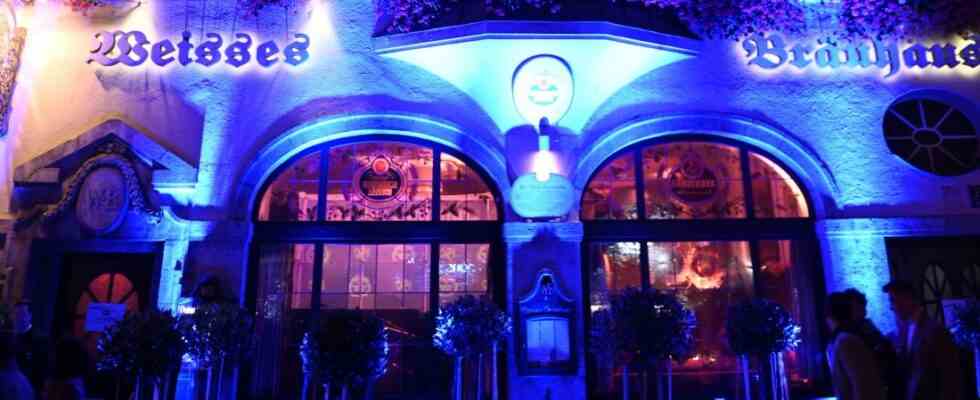Next weekend Georg Schneider will marry his partner Jessy. So the two are starting a family and may have children, including possibly a son. And on this Thursday evening, the 250 invited guests already had a faint idea of what his name might be: George VIII, of course! After all, Georg Schneider is actually Georg VII. Schneider himself, and his father Georg VI. At the front on the stage, Schneider just said “how my great-great-great-grandfather Georg I. together with his son, my great-great-grandfather Georg II., founded the brewery here in 1872”. One learns from this: Not only popes, kings and princes are numbered by first name, but also Bavarian brewery owners. Which is probably why they used to be called “beer barons”.
On this evening, the family brewery G. Schneider & Sohn invited to the Schneider Bräuhaus in the valley to celebrate the 150th anniversary of its founding. Before that, however, we went to the Heilig-Geist-Kirche opposite, for the festive thanksgiving service in baroque splendor with Mozart’s “Coronation Mass” and Handel’s “Hallelujah” from the “Messiah”, performed by the choir and orchestra of Kelheim’s parish church Maria Himmelfahrt. Which would already name the second mainstay of the brewery. Because the Schneider brewery was founded 150 years ago in Munich – but for almost 75 years it has no longer been brewing here, but in Kelheim. It was all a consequence of the Second World War: in a single night of bombing in 1944, the old brewery behind the inn was almost completely destroyed, and the brewery was relocated to the former royal wheat beer brewery in Kelheim, which had already been part of the brewery’s portfolio in 1927.
However, the close connection to Munich never broke off, and neither did the connection to the Catholic Church. “The wheat beer brewing family Schneider was very successful here right from the start,” says Georg VI. in his anniversary speech, “they had so much to do in the brewery and in the inn that the canons of the Heilig-Geist-Kirche always came over after the service and read a quick mass for the employees.” Which – one can assume – might not have been the only reason for the canons to go to the other side of the street.
The restaurant was well frequented almost 100 years ago, as a photo from 1924 shows.
(Photo: company archive)
Nevertheless, the beginnings were not as unproblematic as it sounds. Because even in 1872 it was not so easy to found a brewery, certainly not one that produced wheat beer. For centuries, this had been the privilege of the Wittelsbach family, who financed entire wars with the proceeds. In the 19th century, however, wheat beer went out of fashion and the Wittelsbachs leased many of their wheat beer breweries. And Georg Schneider, at that time master brewer in the Hofbräuhaus and responsible for wheat beer, succeeded in replacing King Ludwig II’s right to brew wheat beer in the Hofbräuhaus.
In addition, he bought Maderbräu not far from the town hall, a small traditional brewery in the city center. In 1844 it was the starting point of one of the biggest beer price riots in Munich, leaving almost all breweries with smashed windows and destroyed pub furniture. In 1865 the Maderbräu had to be foreclosed on, it went to the Bayerische Hypotheken- und Wechselbank, which didn’t really know what to do with it and finally sold it to Georg Schneider and his son for 127,000 guilders.
That was the birth of the Schneider wheat beer brewery and the “Weisses Bräuhaus”, as many Munich residents still call it today. The brewery renamed the traditional inn “Schneider Bräuhaus” a few years ago, but the new name has still not caught on, even though Schneider-Bräu Managing Director Robert Schraml jokingly and aptly described the brewery as “Munich’s oldest and most beautiful flagship store ” designated. A lot has remained the same as it used to be, starting with the first, original wheat beer recipe by Georg I. Schneider, which later also served as the basis for the Aventinus wheat beer, to the “many local supply chains” to which Schneider explicitly stated in his speech.
Or the menu, which is still based on the traditional Munich Kronfleisch cuisine with all kinds of offal. There aren’t many of them anywhere else in the city. And that is probably one of the reasons why the Schneider Bräuhaus was also recognized by the current Gault&Millau Germany. But the kitchen team under head chef Josef Nagler also has a lot of other skills, which they impressively demonstrated at the anniversary celebration with lots of small gastric tortillas – and even with a small excursion into molecular gastronomy to accompany the beef fillet.
Georg Schneider (left) and landlord Ottmar Mutzenbach toast the anniversary.
(Photo: Stephan Rumpf)
In general, there is a lot of variety here at the “longest regulars’ table in the city” (Georg VI.). For the 100th birthday, the 57-year-old Schneider can still vaguely remember, “there was only free beer and brass band music in Kelheim, but there was plenty of it”. But that’s different now: the music comes from them diatonicthe new group of Otto Göttler (formerly Bavarian diatonic yodeling madness)after the main course of the celebratory meal, acrobats scurry through the tavern.
And shortly after eight, Prime Minister Markus Söder actually stops by, so far not so well known as a Munich pub stool and regular table brother. But he also comes to congratulate you. He’s been doing this kind of thing quite whimsically and off the cuff lately, almost in the manner of a stand-up comedian. “Everyone associates Bavaria with beer,” he says, and so it was easy for him to answer Boris Johnson’s very first question after getting off the plane at the summit in Elmau. It had read: “What is there to drink here?”

